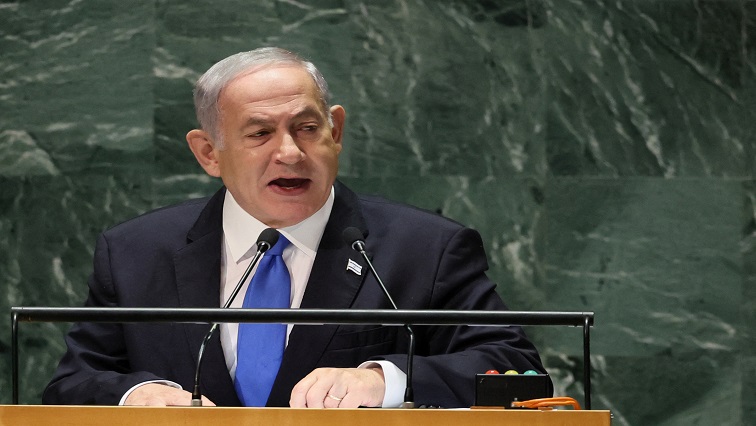Israeli Prime Minister Benjamin Netanyahu said on Friday he believed his country was on the cusp of peace with Saudi Arabia, predicting it could be clinched by US President Joe Biden and reshape the Middle East.
Yet, amid urging by Riyadh and Washington that the Palestinians be included in the diplomacy, Netanyahu told the United Nations General Assembly in New York that Palestinians should not be allowed to veto the regional deal making.
Expectations that Israel might normalize relations with Saudi Arabia, the home of Islam’s two holiest shrines, have been ratcheted up this week.
Saudi Crown Prince Mohammed bin Salman, known as MbS, said a deal was getting closer by the day and Netanyahu and Biden held a long-awaited meeting to discuss the prospects.
Netanyahu described as a precursor the 2020 normalisation accords between Israel and the United Arab Emirates and Bahrain, known as the Abraham Accords and sponsored by then-US President Donald Trump.
“There’s no question: The Abraham Accords heralded the dawn of a new age of peace,” he said. “I believe we’re on the cusp of a more dramatic breakthrough: A historic peace between Israel and Saudi Arabia.”
Such a complex deal would likely require broad support among US lawmakers – a tall order with a presidential election in 2024.
While crediting Trump for the previous deal, Netanyahu made clear he hoped the current Biden administration would clinch this one, though US officials have insisted there is still a long way to go and no guarantee of success.
“I believe we can achieve peace with Saudi Arabia with the leadership of President Biden,” Netanyahu said.
Though he voiced willingness to seek some accommodation with the Palestinians – whose statehood goals are ruled out by his hard-right government – Netanyahu said: “We must not give the Palestinians a veto over new peace treaties with Arab states.”
On Thursday, Palestinian President Mahmoud Abbas told the same forum: “Whoever thinks peace in the Middle East is possible before our people achieved their full right is delusional.”
Netanyahu envisions peace with Saudi Arabia: Sophie Mokoena weighs in
Netanyahu, who has often used the UN podium to warn against Iran, described his country’s arch-foe as the “fly in the ointment” that would try to wreck a deal with Saudi Arabia.
But he cast normalisation as already in the works, citing the now three-year-old air corridor for Israeli carriers over Saudi territory and an ambitious plan, announced by Biden this month, to make both countries part of a rail and shipping network that would run from India to the Mediterranean Sea.
He illustrated the latter with a red line he drew across a regional map – a play on a 2012 UN speech in which he used a marker to draw a proposed “red line” for Iran’s nuclear drive.
“Today I bring this marker to show a great blessing,” he said, deeming normalization with Saudi Arabia “an extraordinary change, a monumental change, another pivot of history.”
In an interview with Fox News, Netanyahu said he was “delighted” to hear the upbeat assessment by MbS, the Saudis’ de facto ruler, in an earlier interview with the US network.
“To borrow a phrase, I think we’re getting closer to peace every day that passes,” Netanyahu said, according to excerpts of a full interview to be broadcast later on Friday.
Netanyahu said he did not want to “minimize the hurdles before us.” But, stressing that he, Biden and MbS all “avidly want a result,” he added: “I think that that really raises the possibility that we’ll succeed.”
Shortly after Netanyahu’s UN speech, the prime minister’s office said he misspoke when he said, “Iran must face a credible nuclear threat” to prevent it from acquiring a nuclear weapon.
Netanyahu’s office said he had misread his prepared text, which called for “a credible military threat” against Iran’s nuclear program. Those words were in line with what he has often said before.
Iran denies it is seeking a nuclear bomb. Israel neither confirms nor denies having nuclear weapons but is widely believed to be the Middle East’s only nuclear-armed state.


